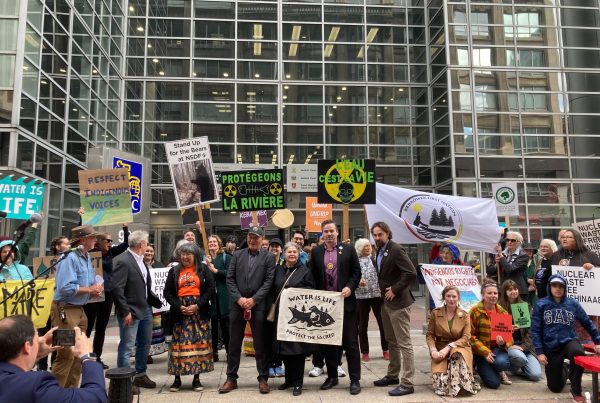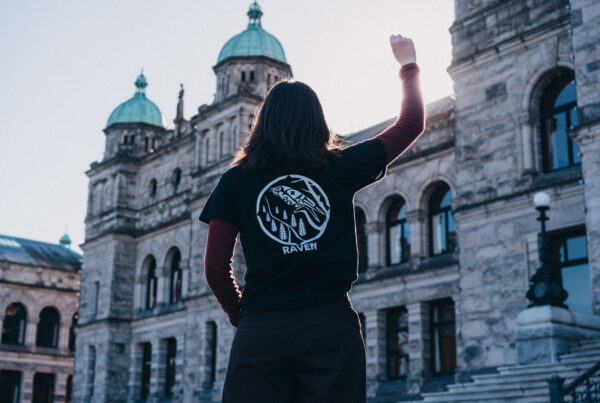Gitxaała’s groundbreaking opposition to B.C.’s outdated and unjust Mineral Tenure Act just got even stronger. It’s now bolstered by the voices of Indigenous organizations, environmental groups, First Nations governments, and responsible mining advocates who have been given leave to intervene in the upcoming court challenge.
This historic legal action, scheduled for a seven-day hearing starting April 3, 2023, will now also benefit from the diverse perspectives of groups like the B.C. Assembly of First Nations (BCAFN), MiningWatch Canada, and Skeena Wild. Four of the intervenors — Gitanyow Hereditary Chiefs, Nak’azdli Whut’en First Nation, Ts’kw’aylaxw First Nation and the coalition of BCAFN, First Nations Summit (FNS) and Union of BC Indian Chiefs (UBCIC) — are funded by RAVEN thanks to our recently introduced Intervenor Fund.
Worthy of note: Of the eight intervenor applications, only one sides with the government of B.C. and comprises, as you might expect, a coalition of mining industry associations whose argument is based on concerns about negative impacts on industry if Indigenous rights should be respected. Interestingly enough, there are also two mining companies intervening in support of strengthening Indigenous rights: First Tellurium and Kingston Geoscience. These companies are committed to an FPIC (Free, Prior and Informed Consent) framework and will argue that B.C.’s free entry system creates an unfair system tilted towards actors who are unwilling to abide by principles of UNDRIP. According to CEO Tony Fogarassy, “Going forward, the UN Declaration’s fundamental proposition of free, prior and informed consent must be at the heart of mineral exploration and mining tenures in British Columbia.”
So, what is Gitxaała’s challenge all about?
Under the current free-entry system, there is no duty on any miner to consult with any Indigenous Nation prior to staking a claim for mineral rights on a parcel of land. That means anyone can, with just $25 and a mouse click, stake a claim online on Indigenous land without so much as notifying the Nation on whose territory they plan to prospect. Gitxaała Nation asserts that this system is unconstitutional because it does not meet the Crown’s obligations to consult, and that the mineral tenure system violates B.C.’s new Declaration of the Rights of Indigenous Peoples Act (DRIPA) legislation.
Says Hereditary Chief Sm’ooygit Nees Hiwaas (Matthew Hill), “The fact that B.C. still grants mineral claims with total disregard for Indigenous nations like Gitxaała is a damaging relic of colonialism that has no place in the present day.”
The cases will be the first legal tests of the province’s DRIPA, which became law in 2019. The act is aimed at addressing decolonization and reconciliation efforts in the B.C. court system. If successful, Gitxaała’s challenge would have a significant impact on how mining is carried out in B.C.
Joining Forces for Mining Justice
In addition to being paired with Ehattesaht Nation — a Vancouver-Island community with very similar mining concerns — Gitxaała’s challenge will be strengthened by the participation of an array of committed intervenors.
The court enjoys wide discretion in deciding who to allow to intervene; the test for intervenors requires that each party brings useful evidence apart from what the main defendants argue, and that they have a special perspective on the issue which is of public importance.
There are eight separate groups now slated to intervene in the Gitxaała petition:
• Gitanyow Hereditary Chiefs and Nak’azdli Whut’en First Nation – supported by RAVEN;
• Nuxalk Nation, as represented by its Chief and Hereditary Chiefs ;
• Ts’kw’aylaxw First Nation, as represented by its Chief and Counsel – supported by RAVEN ;
• B.C. Assembly of First Nations, First Nations Summit, and Union of British Columbia Indian Chiefs – supported by RAVEN;
• Human Rights Commissioner for British Columbia ;
• First Tellurium and Kingston Geoscience;
•MiningWatch Canada, the B.C. Mining Law Reform Network, Wildsight, SkeenaWild Conservation Trust, Kamloops Moms for Clean Air, and Western Canada Wilderness Committee ;
• Association for Mineral Exploration British Columbia, the Mining Association of British Columbia, and the Prospectors and Developers Association of Canada (to argue on behalf of the province).
The hearing begins April 3, 2023. We are so grateful to the RAVEN community for supporting this groundbreaking case. Want to learn more? Visit the campaign page at https://raventrust.com/campaigns/gitxaala.






